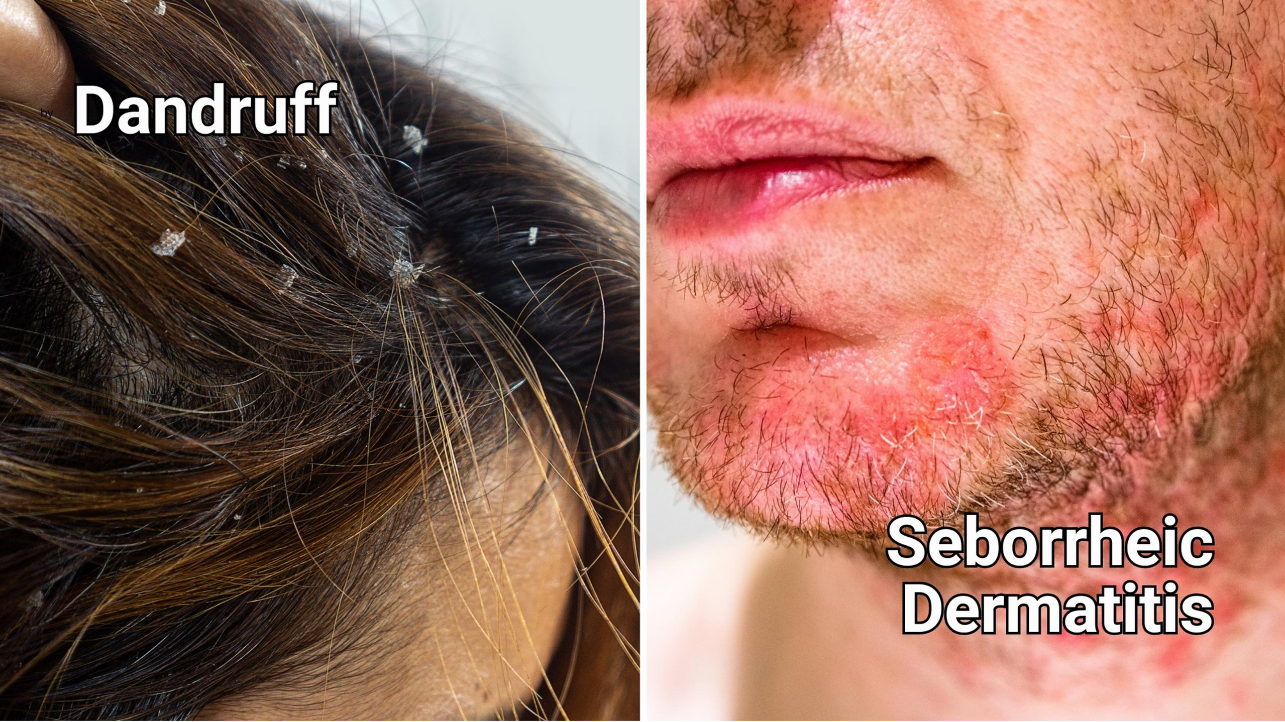What is ketoconazole and what is it used for?
Ketoconazole is an antifungal medication used to treat dandruff and the more inflammatory form, seborrheic dermatitis as well as various fungal infections, including athlete's foot, ringworm, and yeast infections. While it's available in topical and oral forms, with respect to hair and scalp concerns, topical ketoconazole is a safer and more effective approach, as it minimizes potential side effects, targets the affected area directly, and reduces the risk of drug interactions.
What are the hair-related benefits of ketoconazole?
The hair-related benefits of ketoconazole stem from its ability to inhibit the growth of a yeast called Malassezia, which is often associated with dandruff and seborrheic dermatitis. Malassezia can cause irritation of the scalp by triggering an inflammatory response. The yeast feeds on natural scalp oils, breaking them down into substances that some people may be sensitive to. This can lead to itching, flaking, and overall discomfort, affecting scalp health. By reducing the presence of this yeast, ketoconazole can help improve scalp health and reduce the occurrence of flaking and itching. While people often think a dry scalp causes dandruff and flaking, it’s actually just the opposite. Less frequent hair washing allows oil to build up, driving further Malassezia growth.In addition to the anti-inflammatory benefits, there is some research to suggest ketoconazole can reduce levels of androgens (male sex hormones) in the scalp, reducing miniaturization of hair over time.
Can you explain the science of how ketoconazole can help with hair loss?
The science behind how ketoconazole can help with hair loss is not fully understood. This is good evidence that ketoconazole reduces inflammation in the scalp and this may limit future hair loss. There is some evidence to suggest that ketoconazole may have anti-androgenic properties. One study published in 1992 showed in a laboratory setting that ketoconazole can reduce production of androgens, such as DHT, in the scalp. By doing so, it may help mitigate the effects of androgens on hair follicles, particularly in conditions like androgenetic alopecia (pattern baldness). Subsequent studies with topical ketoconazole were discussed in a review article published in 2020. Researchers found in human and mouse studies that ketoconazole can increase hair shaft diameter. However, it's important to note that more research is needed to fully understand the extent of ketoconazole's anti-androgenic effects and its precise mechanisms in this regard. These benefits are not as robust as first line minoxidil or finasteride but may help combat miniaturization.
How do you use ketoconazole for hair growth? What product forms it comes in and how it should be incorporated into a routine?
Topical ketoconazole is available in the form of shampoos or creams. A 1% version is available over the counter and there is a 2% prescription strength available. It can also be compounded with salicylic acid to further remove scale and increase absorption. To incorporate either into your routine, apply the shampoo or cream to wet hair, lather, leave it on for a few minutes, and then rinse thoroughly. Frequency of use varies, but it's often recommended to use it 2-3 times a week. People frequently do not leave the medicine on the scalp long enough. If you apply ketoconazole and wash it out after a minute, it's not going to have sufficient time to treat the yeast. It's critical you leave it on the scalp for at least 3 to 5 minutes. Additionally, this is a long term treatment. If you stop using ketoconazole the yeast will recur.
Are there any side effects or drawbacks to using ketoconazole for hair?
While topical ketoconazole is generally considered safe, some individuals may experience side effects such as skin irritation, itching, or dryness. Ketoconazole shampoo is not necessarily the most cosmetically elegant. Oral ketoconazole on the other hand has a long list of side effects, can interact with various medicines, and affect the liver. It is not used for dandruff or hair growth.Some of my patients google “ketoconazole side effects” prior to using the shampoo and get alarmed by what they see. It’s important to differentiate topical ketoconazole from oral ketoconazole because the side effect profiles are dramatically different. Regardless, it i important to discontinue use and consult a healthcare professional if you experience any adverse reactions.
Is there anyone who shouldn’t use ketoconazole? (such as those pregnant, etc.)
There are no adequate and well-controlled studies in pregnant women, however only tiny amounts are absorbed through the body. The FDA takes the position, ketoconazole should be used during pregnancy only if the potential benefit justifies. The NHS says you can use ketoconazole cream or shampoo if you're pregnant as only tiny amounts are absorbed into your body. Ultimately pregnant or breastfeeding individuals should consult with their healthcare provider before using ketoconazole, as the safety of this medication during pregnancy and lactation has not been extensively studied. It's crucial to weigh the potential benefits against any potential risks in these situations. Always seek advice from a healthcare professional before starting any new treatment.
Dandruff vs Seborrheic Dermatitis
